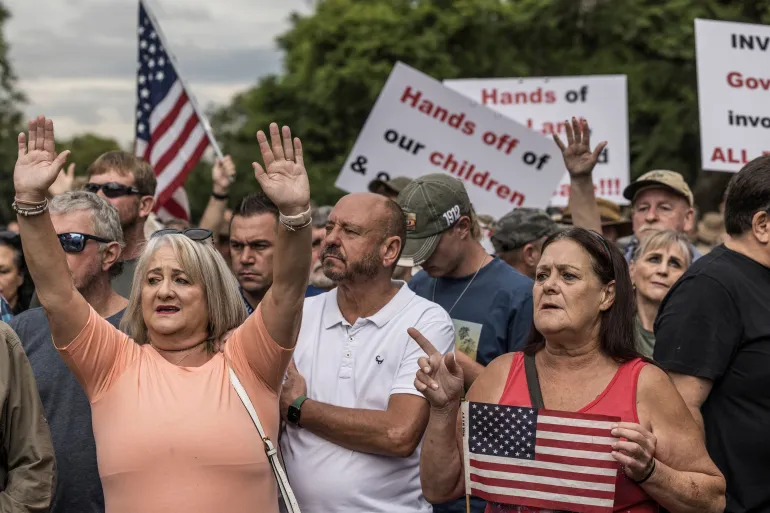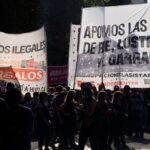
The right -wing support for Africanal complaints should not surprise anyone.
On March 3, Tucker Carlson, a popular American political commentator between the Maga conservatives and the extreme global right, conducted a strange and disturbing interview with the South African right-wing activist and Afriforum Vice-CEO, Ernst Roets. Afriforum is a right-wing South African NGO dedicated to promoting the interests of Africaners-descendants mainly from Dutch settlers who formalized apartheid’s segregationist system in 1948.
The discussion, entitled “Man accused of betrayal for talking to Tucker about the murder of whites in South Africa,” lasted more than an hour and presented a dangerous mix of conspiracy perspectives, inaccuracies, half-truths and blatant lies.
Carlson, always the depraved provocateur, has begun the long conversation with the ridiculous statement that South Africa “seems to be collapsing and that the government is essentially racist and genocidal.”
The idea that the government of South Africa is racist and is committing a “genocide” against the country’s white minority is not obviously new. For many years, white activists, including US President Donald Trump’s special billionaire counselor, Elon Musk, claimed that the South African government is trying to rid the country of its white minorities, and that the murders of white farmers there – which represent no more than 1% of all murders in the country – equivalent to “genocide”.
Trump also promotes this narrative and announced his decision to cut South Africa aid and offer refugee status to Africanks due to such concerns on February 7. A month later, he updated this offer and paved a quick way to citizenship to this allegedly persecuted and threatened minority.
Of course, not only crime statistics, but also many white South Africans, all respected international and local NGOs, and genocide specialists laugh in the face of this myth of “white genocide”. On February 25, a South African court ruled that the allegations of a white genocide in the country are “clearly imagined” and “non-real”.
None of this was explained in the conversation between Tucker and Roets. Instead, South Africa being a failed country and a boiling mass of genocidal violence was accepted as a fact and casually presented as proof of African primitiveness. Throughout the conversation, RoTs has made it clear that he believes that Africans are inherently unable to establish a robust, inclusive and progressive democracy and will always need white control, pressure and guidance to manage a functional country. He did not face resistance.
Of course, RoTs’s portrait makes his homeland and most of the South African people as primitive, violent and genocidal is not based on any reality. South Africa is not in a state of disorder or by committing genocide against a racial minority. Of course, the country has its problems and struggles like any other. But it is in possession of one of the most progressive constitutions in the world, as well as a strong and independent judiciary. The South African state also defends human rights in the international scene, as it recently demonstrated by taking Israel to the CIJ about its conduct in Gaza.
Just 30 years after the end of apartheid, South Africa, no doubt, still fights with its legacy. Great sociopolitical gains have been made ever since, but the legacy of racism and segregation is still clearly visible throughout the country. Unequal access to education, unequal wages, segregated communities and huge economic disparities persist. But almost every day South Africa takes important steps toward true equality and complete racial integration. For example, the African National Congress Governing Party (ANC) recently approved several significant policies of affirmative action. These policies include the Law of Amendment to Basic Education Laws (Bela) and the Expropiation Law. The first is designed to reform education and dismantle a system of linguistic oppression that dates back to the apartheid era and that favors Africaner, the language spoken by Africanks. Meanwhile, the expropriation law details the processes by which governmental entities can confiscate land without compensation for various public interest objectives.
South Africa today, while fighting human rights in the international arena and works to end corruption and discrimination at home, stands out as a brilliant example of how the end of white supremacy could and should be everywhere. It may not be perfect, but it is certainly doing much better than the US, which has not achieved racial integration 165 years after the end of slavery and 60 years since the approval of Civil Rights Act that allegedly ended segregation.
South Africa today demonstrates not only what can be achieved shortly after apartheid, but also how bad the US is going on when it comes to racial integration and equality.
In fact, it is clear that the US did not make much more progress in racial integration, equality and inclusion since the 1964 Civil Rights Law than South Africa has done since the 1994 elections.
A study published in March 2024, for example, revealed surprising similarities in the trends in the difference in racial wealth between the US and South Africa. In South Africa, the study found that the typical black family has 5% of wealth maintained by the typical white family. In the US, meanwhile, the typical black family has 6% of the wealth maintained by the typical white family. The researchers noted that the difference in racial wealth in the US being almost equal to that of a country that recently surpassed the apartheid regime is a “serious accusation” of the richest nation in the world.
In South Africa, Afriforum and other organizations as it are trying to prevent progress ongoing progress by resisting affirmative action policies and lobbying the Trump administration, which you think in the same way. In the US, the alleged “white genocide” in South Africa is being presented to the republican base of a white majority as a history of horror, as programs of diversity, equity and inclusion are being cut.
There is undoubtedly a growing white supremacist reaction against the gains that were made by black communities toward true equality in both South Africa and the US. The conversation between Tucker and RoTs was part of a broader effort to defame South Africa, prevent their progress and, in doing so, strengthening the forces against racial equality in the US.
It seems that a dangerous brotherhood was formed between the far right of the US and South Africa based on a false shared narrative of white victimization and black reach. Those who are fighting for equality and inclusive democracy in any country must be aware of this trend and remain ready to combat it.
Originally published by Al Jazeera on 03/24/2025
Por Tafi District – Colluntheta on Allaher
The opinions expressed in this article are by the author and do not necessarily reflect the editorial position of Al Jazeera.
Source: https://www.ocafezinho.com/2025/03/30/da-africa-do-sul-aos-eua-a-vitimizacao-branca-nao-conhece-fronteiras/

